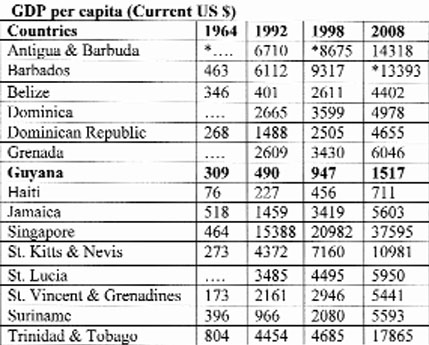Dear Editor,
“Is it wrong to expect and look forward to massive improvements to the living standards in Guyana? Is the idea of writing down our goals bad? Really, what are our goals? What are our goals as Guyanese for Guyana?” (‘The diaspora must come together to help Guyanese at home’ SN, January 26). Of course, none of this is wrong or bad (as a matter of fact, we are usually encouraged, as individuals, to have written strategies for achieving our medium and long-term goals) and if the proposal is a kind of ‘call to arms’ it is most commendable. Nonetheless, it is somewhat bothersome that we are only now at the stage of goal conceptualisation!
The tables below need little comment, for they indicate quite clearly that there has been no “massive improvement to the standard of living in Guyana” since before independence. Indeed, Guyana has regressed to such a state that now we must only shamefacedly attempt to compare ourselves with our Caricom/Cariforum partners. Even Haiti, it would appear, has had almost a ten-fold increase in per capita income since 1964, while Guyana has only been able to muster about half of that. It has now become commonplace for us to claim that we are a ‘Lower Middle-Income Country’ but, particularly since 1997/98 when the momentum of the earlier investments dissipated, that category has also left us standing and our migration trends say that ordinary people are intuitively aware of our dire condition. Contrary to what some may think, Singapore has been included not as a means of self-flagellation or amusement but merely to add perspective!
GDP per capita (Current US $)

Guyana & Lower Middle Income Countries (LMIC)

The PNC attempted to blindside us with a listing of their “numerous” achievements over its twenty-eight years in office. Among other things, it built the Demerara Harbour and Canje bridges, the Soesdyke/Linden, Berbice, East Coast and other highways, many housing schemes with full infrastructure and numerous schools, hospitals, etc, in the hinterland and elsewhere. Today the PPP/C is doing the same thing. We hear of the many housing schemes, the Berbice Bridge, the national sports stadium, international conference centre, street lighting and the many schools and hospitals that have been built and repaired.
Of course, the listing of ‘achievements,’ in this fashion, is unhelpful. Who took on the responsibility to develop Guyana? For example, for nearly three decades the PNC collected our taxes, left us with one of the highest per capita debts in the world and reduced Guyana from being a decently placed Caribbean country to the second poorest in the region, yet still felt that we should thank it for doing a few of the things it promised to do.
A similar argument holds for the PPP/C: the question cannot be what has been built or otherwise done; it is not even about whether the available resources have been used efficiently (although this is important). The major issue is whether, as compared to other similar type countries, the parties have overseen a growth in our economy that has provided us with better lives. On this count, our post-independence governments have all been failures. Even when you use ‘purchasing power parity’ (PPP), look what has happened to Guyana over the last decade as compared with the LMIC group in which we are so proud to be located.
I have said before and I feel compelled to repeat: I do not believe that our country is in this condition because over the last half a century our politicians have been wicked and intended this kind of backwardness.
We simply have a governmental framework, rooted in ethnicity, which is deleterious to any “massive improvements in our standard of living.” This is not to deny the existence of corruption, incompetence, etc, and the duty of citizens to immediately call to account politicians and others who have indulged in such activities. Yet, here also we should note that, the pervasiveness of such undesirable behaviour is not unrelated to the more-or-less unaccountable governance system that the ethnic balance in our society facilitates.
Hamley Case (‘Politicians should suppress ego…’ SN, January 12) has become “extremely weary of politicians who glibly articulate that in their thinking country comes first, while in their hearts it is self that dominates each and every action, and their deepest consciousness.” Of course, the ego-less individual could provide the central theme for a decent horror movie.
Nonetheless, we should accept his point that our politicians and would-be politicians should seek to make the need for immediate systemic governance change the major concern. It is my opinion that, in the present context, giving primacy to political organisations or ambitions will most likely continue our national underachievement and lead to personal frustration. The new arrangement should not be conceived as a grab for power by any group or combination thereof. It should seek a dialectical equilibrium between inclusion and effectiveness, with much weight given to the former.
It is not beyond our collective ability to create a progressive political arrangement that will allow sufficient space for all those with the tenacity to withstand the vicissitudes of normal politics. To claim, as some do, that they are doing their best given the prevailing circumstances, is to fail to recognise, that “circumstances are what we make of them” and that what we have made of them thus far has been most unrewarding.
Yours faithfully,
Henry B Jeffrey

